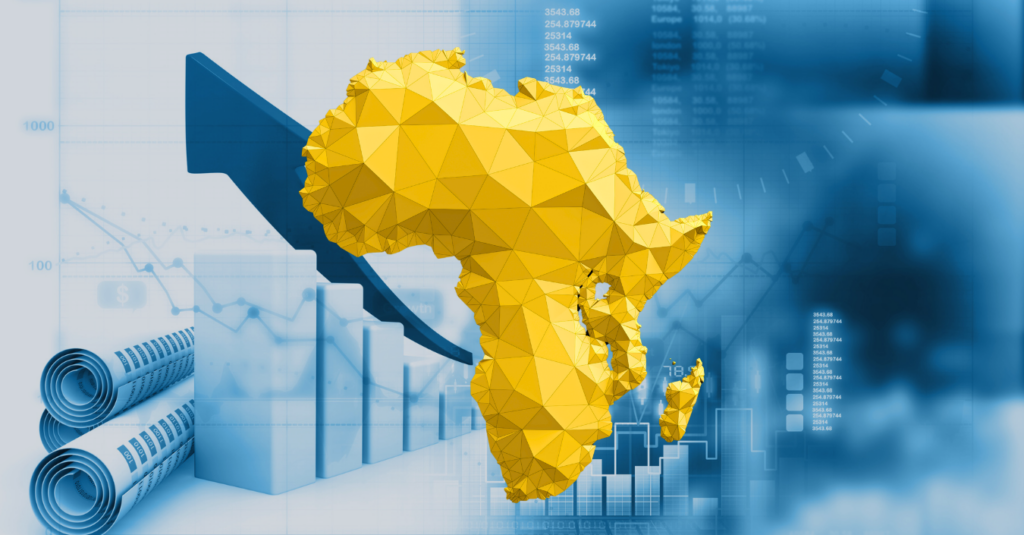Responsible AI in African economic policymaking

Despite AI’s proven efficacy in sectors such as health and agriculture, the potential for AI solutions to inform fiscal and monetary policymaking in ministries of finance and central banks is just starting to be recognised globally. Economic policymaking is a multifaceted process that shapes a country’s economic direction, and it is vital that those policies are effective for the well-being of a nation and its citizens. These include things like setting interest rates, domestic resource mobilisation, economic forecasting, or targeting subsidies.
In this respect, African countries are no different than others. AI has the potential to revolutionise economic policymaking in Africa and transform traditional reliance on human expertise, intuition, and macroeconomic and econometric models for informed decision-making. It can help generate more value with faster and better impact. However, responsible and ethical adoption of AI is paramount, as its misuse could be catastrophic for economies if deployed poorly and without appropriate guardrails and policies.
African stakeholders are beginning to regulate AI through national and continental strategies, frameworks, and regulations. The recently published African Union White Paper and Continental Strategy is an additional pillar of support in this process. Its proactive approach reflects a commitment to ethical and responsible AI applications, although most countries are just beginning to address AI regulation. By integrating responsible AI applications in economic policymaking, stakeholders can ensure ethical economic decision-making while considering the potential risks associated with AI technologies. This approach is crucial for ensuring sustainable and inclusive economic development and transformation in Africa.

Responsible AI principles are vital to African economic policymaking but need to be tailored
Global AI principles are paramount in regulating AI, and it is vital to update existing principles as the technology advances rapidly, as demonstrated by the recent OECD AI Principles update. The fast-evolving debate on privacy and safety, changing policy approaches to intellectual property rights and information integrity, and the global surge in generative AI all made the updates necessary. However, Africa needs international and African-specific principles due to its distinct socio-economic and cultural landscape.
This is especially critical for economic policymaking. African AI principles must resonate with the continent’s cultural values, beliefs, and ethical standards, which might be overlooked in broader regional and global AI development and implementation, particularly in high-stakes domains like fiscal and monetary policymaking. Decisions and models that inform economic policies may have far-reaching impacts on national prosperity, societal well-being, and the livelihoods of all citizens. Errors or biases in AI systems applied to economic policymaking could lead to catastrophic consequences, such as flawed fiscal measures, unintended wealth disparities, or unstable financial systems.
Tailored responsible principles for AI-driven economic policymaking processes will help governments foster stakeholder trust, encourage innovation, and maximise positive impacts on economic transformation, productivity, and equitable distribution of opportunities.
Furthermore, tailored, responsible African principles like those outlined in the White Paper on African Union AI Strategy prioritise inclusivity, address the unique challenges of rural and urban areas, bridge gender disparities, and empower marginalised communities. The White Paper emphasises foundational pillars such as human capital development for AI through education and skills development, infrastructure and data foundations, creating enabling environments for AI development and deployment, fostering AI-driven economic transformation, building sustainable partnerships across sectors and institutions, and implementing rigorous monitoring and evaluation mechanisms.
While this represents an ideal vision for the future, governments have the potential to help close persistent gender gaps in areas like access to credit, business opportunities, and workforce participation by promoting inclusive decisions through AI-driven policymaking responsive to gender-diverse realities. Achieving such outcomes would ultimately lead to more equitable and sustainable economic results.
The breadth of AI’s real and potential impact underscores how essential it is for diverse stakeholders to come together to shape Africa’s responsible AI principles for economic policymaking. This approach echoes objectives in frameworks like the EU AI Act, the US Blueprint for an AI Bill of Rights, and the Principles for the Ethical Use of Artificial Intelligence in the United Nations System.
African governments must lead in establishing their own clear guidelines and standards for responsible AI in economic decision-making and the unique impacts and considerations of AI in economic policymaking. They should take a multi-stakeholder approach involving citizens, civil society, and technology companies because it is crucial to include diverse perspectives and expertise, provide funding and technical assistance, and create contextually appropriate policies that harness AI’s benefits while guarding against potential downsides.
>>> ALSO FROM THE AI WONK: Building the foundations for collaboration: The OECD-African Union AI Dialogue
AI’s potential benefits for African economic policies
In harnessing AI tools to shape their economies, African policymakers must keep their eye on the overarching goal of driving meaningful transformation across the continent—to create more decent jobs, reduce poverty, and ultimately enhance the overall well-being of African citizens. AI can help make this happen faster and more precisely than current approaches.
AI and machine learning can significantly enhance economic policymaking in Africa across several key areas, and African governments can learn from emerging evidence while still in the technology’s early days. For example, AI-powered analytics can help African central banks better understand macroeconomic trends and financial dynamics and make more informed decisions on monetary policy instruments like interest rates and liquidity management.
AI can boost financial data’s efficiency, accuracy, and quality through anomaly detection, pattern recognition, and continuous monitoring – enabling rapid identification of risks and issues. Predictive models and simulations driven by AI can strengthen forecasting capabilities and allow policymakers to anticipate policy impacts under different scenarios for more evidence-based decision-making. AI can also provide insights into citizen sentiment by analysing social media, news, and other data sources – informing more responsive and inclusive policies.
Regarding crisis response, AI tools can rapidly process real-time data to mitigate impacts during economic disruptions and emergencies. AI algorithms can enhance regulatory enforcement by flagging anomalies, irregularities, and potential violations in financial transactions and activities. Advanced AI predictive models can improve nowcasting, forecasting, and scenario analysis capabilities – training on historical data and current indicators to simulate scenarios like exchange rate shocks or crises. These capabilities can enable proactive impact assessments to make better-informed choices on policies and interventions across monetary policy and fiscal measures.
Moreover, Generative AI—particularly Large Language Models (LLMs)— can assist with increased productivity in tasks such as ideation and feedback, writing, background research, data analysis, coding, and mathematical derivations. LLMs can function as virtual assistants, automating micro-tasks that researchers frequently encounter throughout the day but may be too minor to delegate to human assistants. Economists and policymakers can focus their efforts on higher-level analysis and decision-making by offloading these small yet numerous tasks to AI.
The African Center for Economic Transformation (ACET) recently launched a three-year project to explore the potential for AI in economic policymaking, with a strong focus on peer-to-peer learning and sandbox exercises. The project will help governments identify a specific use case and economic policy challenges along with data needs and help ensure responsible and ethical AI applications. These examples will likely be the first AI tools used to address these policy needs. ACET also has a forthcoming paper on the responsible and ethical use of AI in economic policymaking.
Key issues and challenges
The effort to responsibly deploy AI to enhance African economic policymaking faces critical general issues like building public trust and transparency, using high-quality, unbiased data, model interpretability, and human control. But there are also unique challenges such as the lack of established AI policies, data governance frameworks, and regulatory oversight compounds these challenges in many African countries. The vacuum in which AI adoption occurs across the continent is also a significant hurdle. Most nations lack comprehensive AI strategies, data protection policies, and enforcement mechanisms to prevent data misuse and cybersecurity breaches. This lack of guiding principles and regulatory frameworks exacerbates risks and undermines public trust.
Key economic institutions like ministries of finance and central banks need more internal digital literacy and awareness about AI’s potential to ensure effective deployment. Today, decision-makers grapple with understanding AI’s capabilities, strengths, and limitations, hindering strategic integration into policymaking processes.
Critical ethical considerations such as privacy, autonomy, transparency, accountability, and fairness remain vital. AI’s propensity to inherit societal biases from training data risks perpetuating socioeconomic inequalities without careful model design and monitoring. Robust safeguards against exploitation by special interests are imperative.
While opportunities for innovation must be balanced with appropriate governance, Africa’s policymakers should prioritise inclusive, multi-stakeholder dialogues. Engagement with academia, civil society, and impacted communities will ensure integrated economic considerations. Policymakers should also strive to develop structured data ecosystems, improve regional data accessibility, and build data literacy skills, which are crucial enablers.
Transparent, accountable and responsible
The potential for AI tools in African economic policymaking is promising, and upholding responsible AI principles around governance, inclusivity, and accountability is crucial. A multi-stakeholder approach is essential to shape these principles collectively through consultation and research. African-owned and driven, this process should ensure AI-driven economic policies uphold ethical standards, human rights, and sustainable development priorities across the continent.
Transparency and accountability are paramount – AI systems must have transparent, explainable decision-making processes open to public scrutiny while preserving human oversight and final decision authority. By embracing responsible AI through tailored principles, African nations can harness AI’s benefits for innovative, effective, and equitable economic policies that drive inclusive growth and long-term prosperity. Addressing ethical concerns through an inclusive approach aligns AI’s transformative potential with the region’s unique socioeconomic needs.
The African Center for Economic Transformation is an independent, pan-African policy institute based in Accra, Ghana. www.acetforafrica.org


































